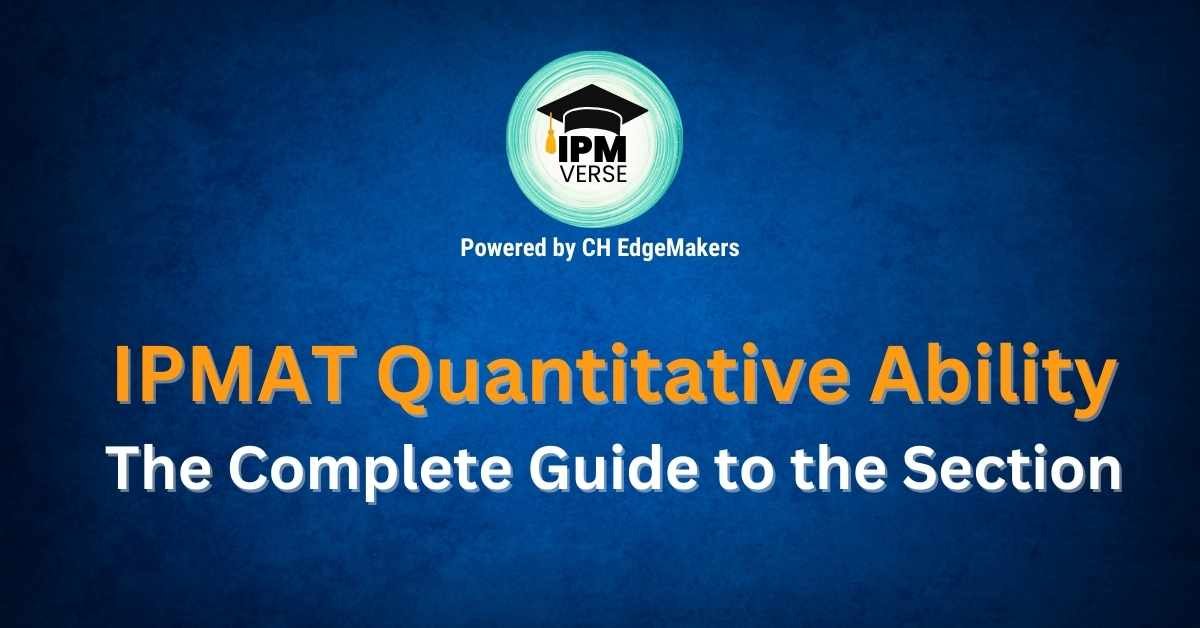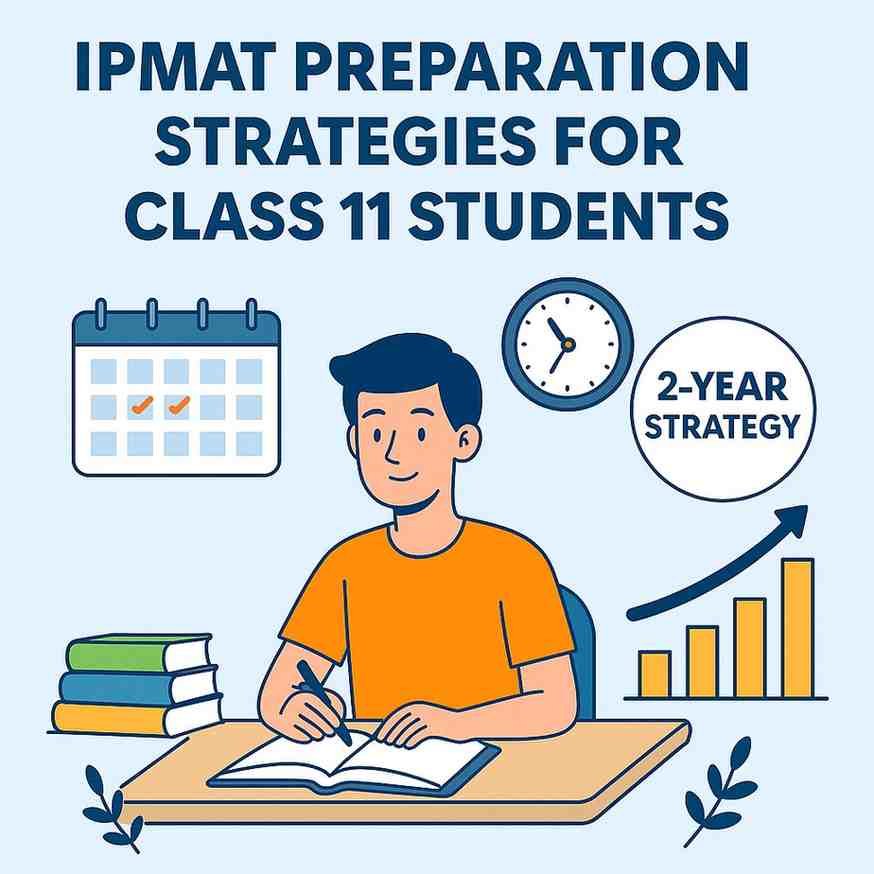Integrated Program in Management Aptitude Test (IPMAT) is an extremely important entrance test for the aspirants who are looking forward to admissions to the five-year integrated management programs in the best colleges like IIM Indore and IIM Rohtak. IPMAT 2026 Quantitative Ability section is typically the toughest section of the test that demands high-level problem-solving skills, conceptual knowledge, and time management. To excel in this section, there should be a proper strategy of preparation.
In this exhaustive guide, we will be talking about good strategies, subject matter of major topics, and tips to ace the IPMAT Quantitative Aptitude section.
Introduction to the IPMAT 2026 Quantitative Ability Section
IPMAT QA section is meant to examine the mathematical proficiency of a candidate. It comprises:
- Multiple-Choice Questions (MCQs) – Four options, and students must choose the correct one.
- Short Answer (SA) Questions – Numerical value answers without choice need to be answered by the examiners (only in IIM Indore’s IPMAT).
Important Features of the QA Section
- Has simple level math questions (Class 6-8 level)
- Arithmetic, algebra, geometry, number systems, and data interpretation
- Speed and quickness as there is a time limit
- A -1 will be given for incorrect answers in MCQs (negative marking is not applied to SA questions).
Key Topics of IPMAT Quantitative Aptitude
A practice-hardened good plan must focus on the below key topics:
1. Arithmetic
- Arithmetic is the nucleus of the QA section. Salient concepts are:
- Percentages, Profit & Loss, Simple & Compound Interest
- Ratio & Proportion, Averages, Mixtures & Allegations
- Time, Speed, and Distance
- Time and Work
2. Algebra
Algebra constitutes concept development and simplification of expressions. Significant topics are:
- Linear and Quadratic Equations
- Functions & Graphs
- Polynomials
- Inequalities and Modulus
3. Number System
This segment includes number properties of a simple nature. Go through them very carefully:
- Divisibility Rules
- LCM and HCF
- Remainder Theorems
- Base Systems (Conversions)
4. Geometry and Mensuration
Geometry is acquiring concepts and understanding figures. Key points:
- Properties of Triangle, Circle, Quadrilateral, and Polygons
- Coordinate Geometry
- Volume, Surface Area, and Perimeter
5. Permutations, Combinations, and Probability
These are the areas which demand reasoning and combinatorial expertise:
- Factorials and Counting Principles
- Arrangements and Selections
- Probability Rules and Expected Value Computations
6. Data Interpretation and Logical Quant
It includes graphical representation of data:
- Tables, Line Graphs, Pie Charts, and Bar Graphs
- Logical Deduction from Sets of Data
- Percentage and Ratio comparisons
Good Prep Plan for IPMAT QA
Step 1: Make Good Fundamentals
Practice difficult questions after ensuring your fundamentals are good. Do the following:
- Read Class 9-12 NCERT maths books.
- Don’t memorize, focus on concepts.
- Keep a formula notebook for quick revision.
Step 2: Practice Regularly with a Planned Approach
Consistency is most important. Follow a chartered practice schedule:
- Practice topic-wise problem day-wise.
- Practice from easy to medium and then challenging gradually.
- Practice mental maths for saving time.
Step 3: Practice Speed and Accuracy
Speed and accuracy are twin twins of competitive exams. Develop them by:
- Practising short cut methods and quick calculations.
- Not leaving careless mistakes by double checking answers.
- Practice questions in timed mode for developing speed.
Step 4: Practice Previous Year Papers and Mock Tests
IPMAT previous year question papers inform us about:
- Nature and extent of difficulty in the test.
- General trend and pattern upon which questions are set.
- Techniques in effective time management when actually writing the test.
Weak and strong points are revealed through practice tests. Split each test into:
- Uncovering weak points and practicing accordingly.
- Boost in the time management per question.
- Increasing confidence level through practice tests under test environment.
Step 5: Tricks and Shortcuts
Learn tricks to save time. Some of the most important tricks are:
- Vedic Math tricks to speed up calculations.
- Digit Sum Method to check answers.
- Elimination Strategy to prevent wrong choice answers in a rush.
Step 6: Avoid Common Mistakes
The majority of the contestants lose marks by making avoidable errors:
- Reading questions error – Read slowly to understand what is required.
- Taking too much time on a question – Avoid hard questions and return to them later.
- Failing to complete messy rough work – Ensure that rough work remains legible and organized.
Time Management Ability Under Test
There has to be an excellent try strategy for securing the best. Use this strategy to gain successful time management:
Step 1: Start with simple questions to acclimatize.
Step 2: Do not waste more than 2 minutes per question. If not possible, proceed to the next question.
Step 3: Finish the last 5-10 minutes on tough questions.
Recommended Time Spent
| Section | Time Spent |
| Easy Questions | 15-20 minutes |
| Moderate Questions | 20-25 minutes |
| Tough Questions | 10-15 minutes |
Additionally you can keep 5- 10 mins for review and corrections
30-Day Study Plan for IPMAT Quantitative Aptitude
In order to prepare QA section in an organized manner, follow below mentioned 30-day study plan:
1st Week : Conceptual Clarity
- Re-cover Arithmetic and Algebra fundamentals.
- Pose simple questions to both the candidates.
- Perform basic arithmetic on a daily basis.
2nd Week : Practice at Moderate-Level
- Practice Number System and Geometry.
- Practice last year.
- Gain speed with short-cut methods.
3rd Week: Advanced-Level Questions & Mock Tests
- Practice tricky questions of all the topics.
- Give 3-4 full-length mock tests.
- Note down mistakes and practice weak areas.
4rth Week: Intensive Practice & Final Revision
- Re-do the formulas and concepts.
- Sectional tests every day.
- Develop time management for the actual test.
IPMAT Quantitative Aptitude Study Material
Best Books for IPMAT QA Practice – BUY Books
- NCERT Mathematics (Class 9-12) – For concept
- Quantitative Aptitude by R.S. Aggarwal – For easy practice and medium level difficulty
- Fast Track Objective Arithmetic by Rajesh Verma – For short cuts
- Arun Sharma’s Quantitative Aptitude for CAT – For solving problems at higher difficulty level
- IPMAT Previous Year Question Papers – To get yourself used to patterns of exams
- Good Online Study Material
- YouTube channels offering free methods of problem-solving
- Coaching institutes like CH EdgeMakers providing rich mock series.
Final Words
Conceptual clarity, everyday practice, and proper time management are what you need to crack the IPMAT 2026 Quantitative Ability section. Sticking to a tight schedule, recalling the major subjects, providing mock tests, and avoiding errors will allow you to enhance your performance in this section by a significant extent.
Never forget that persistence and hard work are the key openers to success. Work diligently, believe in yourself, and attempt IPMAT 2025 to the best of your ability. Good luck
IPMAT 2027 full beginner guide: syllabus, pattern, eligibility & Best
IPMAT 2027 Beginner Guide IPMAT 2027 Beginner Guide : Hey If you are reading this and are studying in class 9,…
IPMAT vs JIPMAT vs SET – Which Entrance Exam Is
IPMAT vs JIPMAT vs SET – Which Entrance Exam Is Right for You? Are you the one who is studying…
Can Commerce, Arts, or Science Students Crack IPMAT?
Can Commerce, Arts, or Science Students Crack IPMAT? You must have heard a lot of time people saying that the students…
Top MBA Entrance Exams in India 2026: Key Dates &
Top MBA entrance exams in India : An MBA is not a degree it is a roadmap to life. It…
IPMAT Preparation Strategies for Class 11 Students – 2 Year
IPMAT is an extremely competitive entrance examination held by the Indian Institutes of Management (IIMs) for the five year integrated…
Top Career Options After IPMAT: Why IIM Indore is Worth
Integrated Program in Management Aptitude Test (IPMAT) is the gateway to one of India’s most prestigious management programs—the five-year Integrated…









